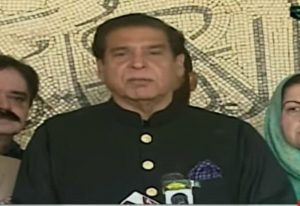The speaker of the NA has stated that she will not accept any resignations from the PTI unless she is “satisfied.”
Ashraf refuses to ‘deseat’ lawmakers while urging the previous ruling party to make a comeback to parliament.

Raja Pervaiz Ashraf, speaker of the national assembly, encouraged PTI leaders to come to the legislature on Sunday and declared that he would not accept any resignations unless he was “satisfied.”
It is important to remember that PTI leader Qasim Suri accepted the resignations of 123 PTI MNAs on April 13 while serving as the acting speaker. These MNAs had responded to their party chairman Imran Khan’s appeal after Khan was ousted as prime minister by a no-confidence vote earlier in the month.
However, on April 17, Raja Pervaiz Ashraf, the newly elected NA Speaker, gave the assembly secretariat instructions to handle the PTI MPs’ resignations once more and give them to him so that they could be handled legally.
The 22nd speaker of the assembly issued his decision in the wake of allegations and rumours that some former parliamentarians from the ruling party were eager to quit and were sending out signals that their resignations should not be accepted.
Later, in June, the ruling coalition developed a plan regarding the issue of PTI lawmakers’ en masse resignation from the National Assembly and decided to move through with phase-wise acceptance.
Around 30 members of the former ruling party did not want to leave the assembly, according to parliamentary sources, who also said that they may meet with the NA speaker directly to prevent their resignations from being accepted.
After learning that the MPs had not been summoned in a personal capacity before the speaker of the National Assembly, the IHC later referred to the resignations of 123 PTI MNAs as “suspicious.”
The PTI then appealed to the SC the IHC ruling that deemed it unlawful to accept the resignations of PTI lawmakers. However, the Supreme Court has backed up the High Court’s recommendation to the PTI to return to the legislature.
The speaker added that “there are norms and a due mechanism in place for receiving resignations” while addressing journalists in Lahore today. I accepted the resignations of my pals who had quit their jobs and then announced their resignations on television, in the press, or in the newspapers at various times.
According to him, even if a member approaches me and claims they have resigned but I have knowledge that they are under duress and being under pressure, I will not accept their resignation, he said.
However, he continued, “the situation is completely different here; they continue to remain in the [parliamentary] lodges […] they continue to enjoy the benefits of the secretariat and then they send messages asking the speaker to reject their resignation, which forces me to give the matter a lot of thought.
He continued, “I will not remove anyone until I am satisfied; in fact, I now hope that they will come and sit in the parliament.”
The speaker stated, “They should carry out their obligations as representatives since they have the mandate of their individual areas.
He replied, “What forum would we all assemble in if we would not go to parliament? If people want transparent elections, then it is only feasible if we adopt laws for that, […] if we build a strategy along with the consensus.
”Ashraf insisted that “the divide between opposition and government” is the “best solution” to all problems relating to governance.
In response to inquiries, the speaker added that she believed it was crucial for assemblies to complete their terms because “premature dissolution of assemblies prevented democracy from taking root.”
He emphasised that “completing the term for the fourth time will strengthen institutions” and pointed out that over the previous 15 years, the assemblies had completed their terms.
It is vital that all political parties come to an agreement to address issues, he said, adding that “this is not about an individual’s win or failure.”











































